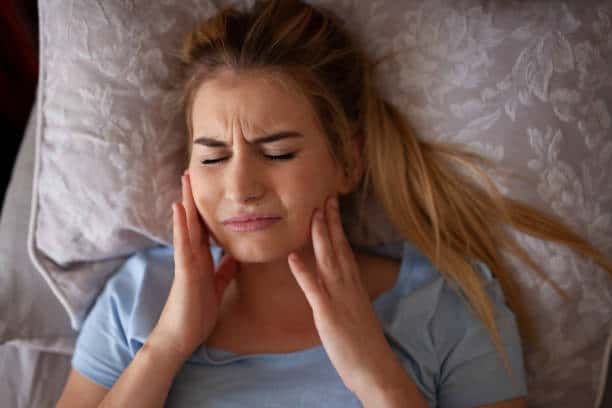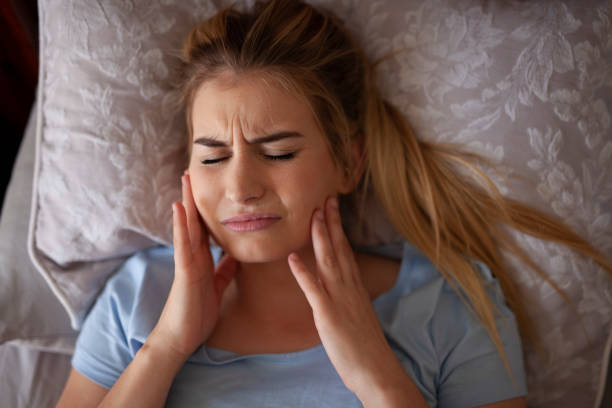
15 Apr Why You Should Be Concerned About Nighttime Teeth Grinding
Nighttime teeth grinding—also known as bruxism—is one of those conditions that often flies under the radar. Many people don’t even realize they do it until a partner points it out or a dentist sees the damage. At first glance, it might not seem like a big deal—just a little unconscious movement during sleep.
But the reality is that bruxism can have serious consequences for your dental health, physical comfort, and overall well-being. Understanding why it happens, how it can harm you, and what you can do to stop it can help you protect your teeth and improve your quality of life.

Reasons for Grinding
There isn’t a single reason why people grind their teeth at night. In fact, the causes are often complex and interconnected. One of the most common culprits is stress and anxiety. When you carry mental tension throughout the day, your body may try to release it during sleep through muscle activity, including jaw clenching and teeth grinding. The more stressed or overwhelmed you are, the more likely your body is to react in this way.
Sleep disorders, such as obstructive sleep apnea, can also be a significant factor. Occasionally, grinding occurs in response to breathing interruptions during the night. Your body may be trying to reopen the airway, and that movement can result in jaw clenching or grinding. Other times, an abnormal bite or misaligned teeth can cause the upper and lower jaws to meet in a way that triggers grinding during sleep.
Certain medications, especially antidepressants like selective serotonin reuptake inhibitors (SSRIs), have been linked to bruxism. Additionally, lifestyle choices like smoking, heavy alcohol consumption, or excessive caffeine intake can increase your risk of grinding, especially when consumed close to bedtime. Genetics may also play a role—if your parents grind their teeth, you might be more likely to do it as well.
Dangers of Teeth Grinding
While occasional teeth grinding might not cause significant harm, chronic bruxism can lead to serious dental and health problems. One of the most immediate issues is tooth damage. The pressure from grinding can wear down enamel, flatten the biting surfaces of your teeth, and even cause cracks or fractures. Over time, you may notice increased tooth sensitivity due to enamel erosion or even loose teeth.
Bruxism can also wreak havoc on your jaw joint, leading to a condition known as temporomandibular joint disorder (TMJ). When chewing or talking, people with TMJ often experience jaw pain, stiffness, headaches, earaches, and clicking or popping sounds. Chronic jaw tension can radiate into the neck and shoulders, causing muscular pain that lingers during the day.
Beyond physical discomfort, nighttime teeth grinding can disrupt your sleep. Even though you may not wake up fully, your body experiences interrupted rest due to the muscle activity. This can result in daytime fatigue, mood swings, and difficulty concentrating. If you share a bed with someone, your grinding may also affect their sleep, creating tension in your relationship.
Ways to Prevent Teeth Grinding
If you suspect you’re grinding your teeth at night, the good news is that there are many effective prevention strategies. One of the first steps is to address the root cause. If stress is driving your bruxism, then adopting stress-reduction techniques like deep breathing, meditation, regular exercise, or counseling can significantly reduce your nighttime clenching. Identifying emotional triggers and working through them can make a huge difference.
Mouthguards are one of the most common and practical tools used to protect your teeth. These devices, often custom-made by dentists, are worn at night and act as a barrier between the upper and lower teeth. They don’t necessarily stop the grinding behavior, but they prevent further wear and tear. Over-the-counter guards are also available, though they may not be as comfortable or durable.
If a misaligned bite contributes to your grinding, orthodontic treatment such as braces or Invisalign might be recommended. For people whose bruxism is linked to sleep apnea or another sleep disorder, CPAP therapy or other medical interventions can be effective.
Limiting stimulants like caffeine and alcohol, especially in the evening, may help reduce the grinding intensity. Establishing a relaxing bedtime routine—like taking a warm bath, dimming the lights, or listening to soothing music—can also calm your nervous system before sleep and reduce the chances of grinding.
Other Things You Can Do to Your Teeth Unconsciously
Grinding isn’t the only unconscious habit that can damage your teeth. Many people engage in behaviors throughout the day that they don’t even realize are harmful. Jaw clenching during periods of stress or focus is incredibly common. If you find yourself biting down when you’re driving, working, or even watching TV, you could be putting your teeth under unnecessary pressure.
Another common issue is nail biting, which may not seem serious, but it can lead to chipped teeth or introduce bacteria into the mouth over time. Similarly, chewing on pens, ice, or other hard objects can wear down enamel and increase your risk of cracks.
Tongue thrusting—when the tongue pushes against the teeth while swallowing or speaking—can cause alignment issues over time. Even something as seemingly harmless as grinding while awake (known as awake bruxism) can cause significant damage if left unchecked.
Often, people are unaware of these habits until a dentist points out the signs. Self-awareness is key. Try to check in with your jaw and mouth throughout the day, especially during stressful moments. If you notice that your jaw is clenched, take a moment to relax and release that tension.

Good Habits to Help Heal Teeth Subjected to Teeth Grinding
If your teeth have already taken a beating from grinding, the healing process involves both preventing further damage and supporting dental health. Start by maintaining excellent oral hygiene. Brush twice a day with fluoride toothpaste and use a soft-bristled toothbrush to avoid adding additional wear to your enamel. Floss daily to prevent gum issues that can compound existing problems.
Your diet also plays a role in protecting your teeth. Avoid sugary snacks and acidic foods that can weaken enamel further. Instead, eat a balanced diet rich in calcium and vitamin D, which supports strong teeth and bones. Drink plenty of water to help rinse away food particles and keep your mouth hydrated.
If your enamel has been worn down, your dentist may recommend reparative treatments such as bonding, crowns, or veneers to restore the structure and appearance of your teeth. More extensive restorative work may be needed for severe damage, but addressing the issue early can help you avoid that.
Incorporating jaw exercises and physical therapy can help loosen tight muscles and improve joint function. Gentle stretches or massage techniques for the jaw and neck can ease pain and reduce the habit of clenching. Your dentist or a physical therapist can show you how to perform these safely.
Mindfulness practices, like progressive muscle relaxation or biofeedback therapy, can train you to be more aware of tension in your body, including your jaw. These tools can help retrain your muscles and your mind to avoid unconscious grinding or clenching.
Finally, make regular dental visits a priority. Your dentist can monitor the condition of your teeth and recommend early interventions before small issues become big problems. They may spot signs of grinding that you wouldn’t otherwise notice, like tiny fractures or worn-down chewing surfaces, and can customize a treatment plan to fit your needs.
Final Thoughts
Nighttime teeth grinding might seem minor, but its effects can be far-reaching. From cracked teeth to chronic jaw pain and poor sleep, bruxism takes a toll on both your oral health and your quality of life. Understanding the causes, being aware of unconscious habits, and adopting good preventative and healing practices can go a long way in protecting your smile.
If you suspect you might be grinding your teeth, don’t wait—talk to your dentist, evaluate your stress levels, and make small changes that could make a big difference. Your teeth—and your sleep—will thank you.


Sorry, the comment form is closed at this time.